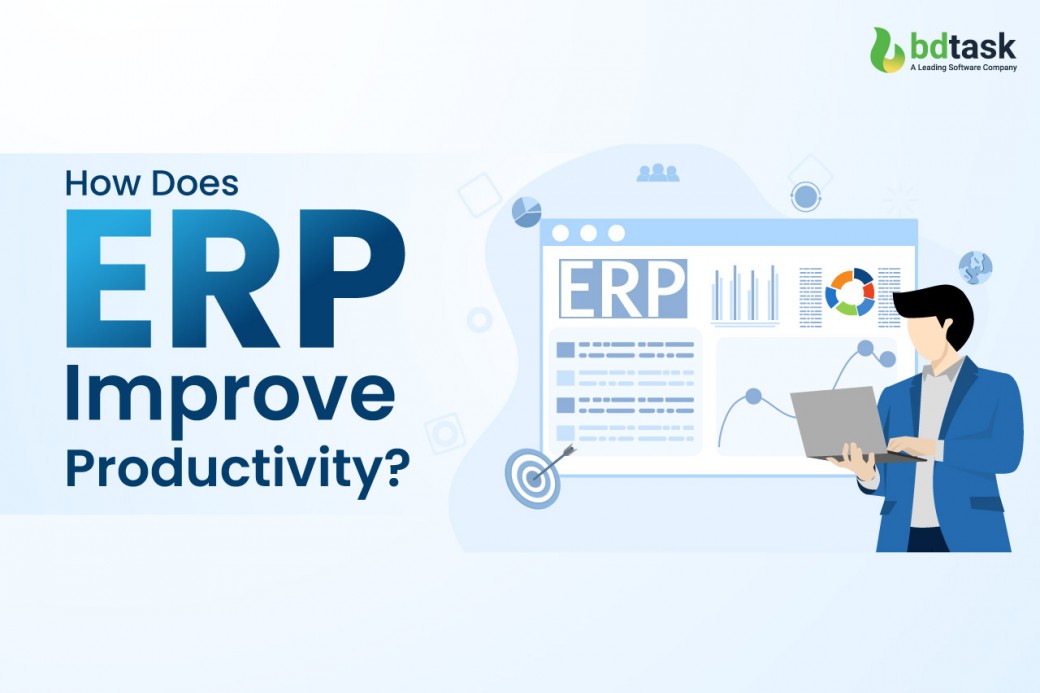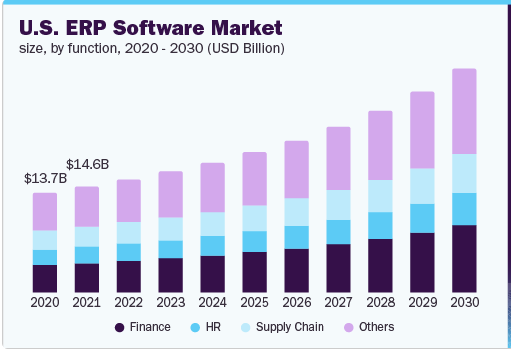How Does ERP Improve Productivity and Growth For Business

As the organisation grows, so does its operation, but how does ERP improve productivity? It's simple. Undoubtedly, the ERP system brings multiple benefits that will enhance productivity.
Obviously, It's necessary to recognise ERP's impact in today's business world. An effective way to improve your e-commerce business is to implement an ERP system in your industry.
Today, every business is going to experience a global boom. This is one of the main reasons to introduce an ERP system as your ultimate weapon.
It is the best way to lessen your business's multiple costs.
Not convince? yet Here, we gather some of the most important topics that can prove that ERP systems improve businesses' overall productivity.
What is Enterprise Resource Planning
Enterprise resource planning in short form in ERP.
Indeed an ERP system is your optimal choice to make your company's operational process smoother. It's a software package that helps with almost every task. Tasks like (inventory management, supply chain, productions, finance, accounting, and CRM pretty smoothly.
When employees give their best? Do you have any idea about that?
The answer is to give them the right tools and resources and pay them appropriately. Enterprise resource planning is the right tool for improving the overall Company productivity.
Of course
The main goal of the ERP system is to help companies become more efficient by automating repetitive tasks.
Why Should You Use ERP System
Let's check some statistics about ERP implementation improvement near this year.
As I have said
The global market size for ERP software was USD 54.76 billion in 2022. It is expected to reach at a CAGR of 11.0% from 2023 to 2030.

Source: grandviewresearch
In the above diagram, we clearly show that ERP implementation rates are increasing daily. It's not only in the USA but worldwide, especially in China, India, Brazil and other rising countries.
Implementing an ERP system can reduce the raw materials cost by 25-30%. It is an outstanding saving for any small, medium or large Company.
As businesses grow and evolve, their needs change, requiring scalable and flexible solutions to accommodate expansion. Sales ERP systems provide the infrastructure to support growth and adapt to changing business requirements.
This scalability ensures that organisations can continue to leverage their ERP investment over the long term, driving sustainable growth and success.
how does ERP improve efficiency
The answer is customer satisfaction
Nowadays, everybody is concerned about customer expectations. A dissatisfied consumer never comes back. An ERP system provides easy access to data at all times. This enables you to communicate progress and make necessary adjustments in real-time.
Definitely, It can help build strong customer relationships, improve customer experiences and increase repeat business.
The ERP system will help your customers access accurate data and information.
Access to a centralised ERP system is an added advantage that can help you achieve these goals.
What industries use ERP systems?
Some examples of industries that use ERPs:
- Manufacturing
- Distribution
- Professional Services
- Automotive Parts
- Transport & Logistics
- Metal/Steel
- Food & Beverage
- Telecommunication/Media
- Construction
- Industrial Services
- Healthcare
- Hospitality
More or less you have to learn how to use ERP software to find out the best output.
As a result, Each of the industries benefited from the ERP system. So why don't you upgrade your system? Still, if you need clarification, let's check how ERP improves productivity.
How Does ERP Improve Productivity
The ERP (Enterprise Resource Planning) system is very demanding. You are confident that the ERP system helps provide your Company with every functional process and data security.
Every Company consists of several departments.
Such as:-
Human Resources, Sales Department, Administration, Marketing Department, Customer Relationship Management, Exports, Imports, etc.
All of these departments need to work perfectly also productively.ERP system helps to operate all the department chaos smoothly.
Now, break down how does erp improve productivity in any business.
How ERP improves business performance?
However, The Very frist step in improving the performance is through data integration.
1. Data Integration Process
An ERP system integrates the data of different departments and functions of a Company to meet the database requirements. It provides one-time access to accurate and up-to-date systems so employees can make quick decisions at the right time.
However, If All the data is in one place, it can be easier for the employees to save time. ERP System helps with Data integration that can enhance your productivity.
2. Easily Communicate And Collaborate Process
This is where ERP system make all the necessary difference
These systems facilitate communication and collaboration across various departments by streamlining business processes.
From a collaboration perspective,
ERP systems enable two different departments to work together by sharing information efficiently to increase a Company's productivity.
It's a fact
The success of a Company depends on the cooperation of each team.
ERP system is the medium that builds communication with team members.ERP systems provide all the data in one place so that all departments can easily access and share it. So, collaboration work is done proactively.
In fact, ERP boosts many processes. Process like
- Cross-departmental collaboration
- Facilitates communication
- Provides visibility
- Encourages accountability
- Enables role-based access.
Teams can establish a common language and reduce errors by documenting and communicating best practices and industry standards.
3. Ongoing Support 24/7
ERP system provides real-time and accurate data analysis support. A manager or executive can access it immediately and get real-time information.
With an ERP system, get any information like business, including sales, production, inventory and finance, within a minute.
Evidently, Decision-making in any Company is quite crucial for any upper post holder. With the help of ERP, you get real-time support. When you get real-time updates on your business, it's easy to decide. It's also an error fee.
Through proper decision-making, problems can be solved quickly and effectively.
4. Simplify Business Accounting Process
Accurate and timely delivery of financial reports is essential for any Company.
Operating manually, accounting, and finances are challenging for any business. It's also time-consuming and challenging. A simple mistake can cause significant damage. If you have an ERP system in your organisation, then congratulations.
Indeed, You save the day and day after next year for your Company.ERP accounting system provides powerful and accurate financial performance and cash flow reports.
After installing ERP system software, you can handle analysing, sorting, and integrating financial data.
With this standardised ERP workflow, businesses can reduce unexpected costs and improve productivity.
5. Workflow In Supply Chain Management
Supply chain management is a complex project to handle. ERP plays a vital role in storing data and tracking products.
ERP system gives a real-time update for supply chain management. Supply chain management ERP modules improve the visibility of your business.
Supply chain planning is needed to make sure that production meets consumer demands. Proper planning needs an appropriate system. So ERP helps out all those supply chain planning processes.
6. Increase Customer Engagement
Customer relationship management is essential for any business. In any business, customer satisfaction plays a vital role in improving productivity. Customer relationship management automates customer interactions.
As a result, With the help of ERP, you can track movement and data. ERP streamline operations and facilitates quicker access to data. So you can quickly respond to customer queries and issues with unbelievable speed and efficiency.
7. Secure Your Data from Outsider
Besides, data security is the top concern in any business.
So, every day, you have to deal with millions of data. This data contains many personal sensitive information. It needs to be protected from unauthorised access and data thrift.ERP systems have a feature that is an encrypted data process.
So, Encryption is the method of converting data into an unreadable format. So, it can ensure that if unauthorised individuals try to access the data, they will not be able to access it because it needs an encryption key. Another feature is access control. Access control ensures that only authorised people can access and edit the file.
However, the ERP system also maintains regular audits that record all other activities in this particular system. These audit trails capture information like log-in attempts, data modification and system modifications.
So, all of these build customer trust and improve customer engagement. Finally, all of that converts into the Company's overall productivity.
8. Improving Business Performance and Productivity
In a Company, many employees are working there. Keeping an eye on them is pretty impossible.ERP system creates an analytical dashboard with information and data with every team. It provides real-time information. So, to collect and compile data, upper management can immediately start.
It also automates some manual tasks like data entry and copy-pasting data. All of these processes are consuming unnecessary time. Implementing an ERP system can save many times. With more time on your hands, employees become more productive in their work.
So, using this feature makes it easy for any business to improve its business performance and productivity.
9. Keep Track Your Inventory
With the implementation of an ERP system, you can easily keep accurate track of the stocks in warehouses.
Inventory control improves total productivity levels and gives greater visibility. Warehouse managers get real-time data, which will help them make more accurate decisions.
Indeed, This ultimate level of visibility enables you to maintain the exact quantity and fulfil customer demand.
By optimising your inventory, you can reduce many costs, like
- Carrying costs
- Minimise wastage
- Improve cash flow
- Determine the ideal quantities to order.
Finally, Organisations should follow best practices for ERP implementation to maximise the chances of success.
Moreover, This includes gaining buy-in from key stakeholders and conducting thorough requirements analysis. But selecting the right ERP solution for their needs.
Additionally, comprehensive training programs and ongoing support are essential for ensuring employees can effectively utilise the system.
Summing Up
ERP plays a crucial role in improving productivity and efficiency in modern businesses. How does ERP improve productivity? Now you know the answer. Introducing ERP software helps to improve the overall process and improves your entire business productivity.
Above all challenges may arise during implementation, but the long-term benefits of ERP far outweigh the initial investment.
Affiliate Disclosure: This content contains some Envato affiliate links. If you make a purchase through these links, we may earn a commission. This does not affect the price you pay. We have all rights reserved for these software products, as they are our own.










